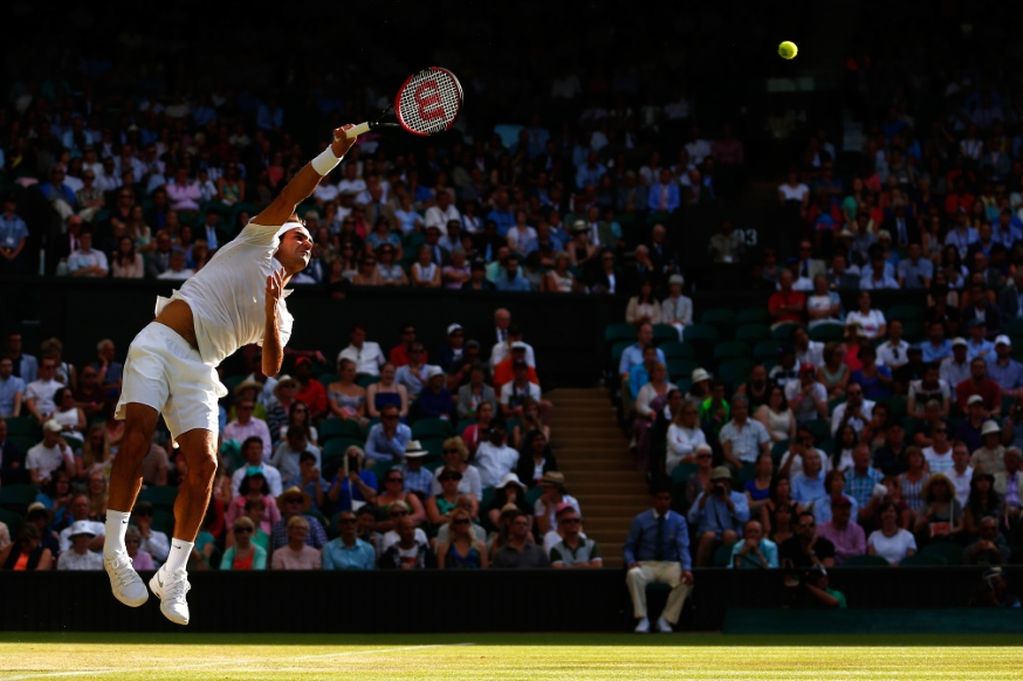Friday
Whether or not he wins today, Roger Federer is making me feel young again after his stunning come-from-two-sets-behind win again Marin Cilic in the Wimbledon quarterfinals. Cilic is the player who kept Federer from reaching the finals two years ago at the U.S. Open, but the Swiss player’s coolness under fire prevailed on Wednesday.
To celebrate Federer’s contributions to the sport, here’s a Maxine Kumin poem that compares tennis to a long and loving marriage. “Prothalamion,” a word coined by Edmund Spenser, means “song in celebration of a marriage.”
Note the elaborate dance between the two players. When two people are engaged in a game, or a marriage, the entire universe contracts to “the square I live in, measured out with lime.” And yet, at the same time, we grow into an awareness of the depth of the other. “The far court opens for us all July” and the two improve each other. They come to see the sweat that they’re both made of:
Prothalamion
By Maxine Kumin
The far court opens for us all July,
Your arm, flung up, like an easy sail bellying.
comes down on the serve like a blue piece of a sky
barely within reach and you, following,
tip forward on the smash. The sun sits still
on the hard white canvas lip of the net. Five-love
Salt runs behind my ears at thirty-all.
At game, I see the sweat that you’re made of.
We improve each other, quickening so by noon
that the white game moves itself, the universe
contracted to the edge of the dividing line
your toe against–limbering for your service,
arm up, swiping the sun time after time–
and the square I live in, measured out with lime.
Further thoughts: This poem keeps growing on me as I detect further complexities. Kumin doesn’t romanticize marriage, even as she celebrates it. Your spouse, for instance, can come smashing into your space, and a lot of the action occurs in the brutal heat of noon, with no shade in which to hide. Your partner’s foot threatens to cross a line with a foot fault, and the lines, as the poem goes on to note, stake out your own private identity. You try to make clear your boundaries and the net between you is a hard white canvas lip, but that doesn’t mean that the partner won’t intrude. The two of you must be careful how you measure out the lime. (Lime lines indicate that Kumin’s contest takes place on grass.)
In other words, there is conflict as well as mutual improvement in a marriage. In fact, the two go together.
And if the marriage lasts, the same drama goes on and on, with the other continually swiping the sun in an action that is partially hostile. But note how we don’t know who wins this particular tennis game. True, after the first swipe, he is up five-love. But love is still present and then, a little while later, the score is thirty-all, suggesting that an equilibrium is reached. That equilibrium is suggested also in the fact that both the speaker recognizes that both she and her partner are sweating and that the poem considers it irrelevant who has won. More important is that the relationship has taken on a dynamic of its own: “The white game moves itself.” Your whole life is quickened–animated–and contracted into this relationship with the other.
A friend who refs games told me that, in tournaments, the central line can never be crossed for any reason other than to change sides on odd games. In other words, you can’t even reach over the net or cross the invisible line that extends beyond the net to retrieve a ball. The rule, we decided, is to keep people from manually confronting each other. In casual play, of course, players reach over the net to retrieve balls all the time (although your racket still can’t cross the plane of the net when the ball is in play). As a metaphor for relationships, however, it’s worth emphasizing again how important it is to communicate boundaries to your partner.


